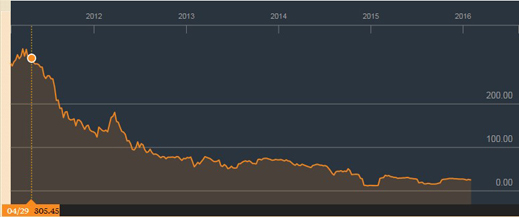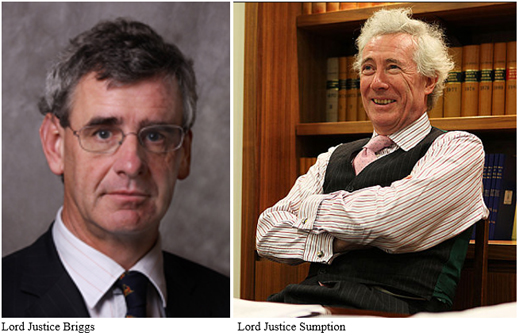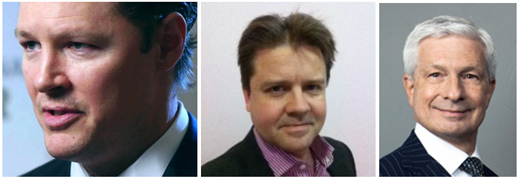
By John Helmer, Moscow
The takeover of London-listed JKX Oil and Gas Plc, which was completed last week with a purge of the board and senior management, is an operation for the benefit of Igor Kolomoisky (lead image, right) and Gennady Bogolyubov, the Ukrainian oligarchs, according to sources in Kiev, Moscow, and London. Proxima Capital Group, a Moscow-based investment firm which won a vote of JKX shareholders on January 28 with 19.97% of the shares and took over leadership of the company, is led by Vladimir Tatarchuk (left). Proxima has announced it has a “fresh perspective” towards Kolomoisky and Bogolyubov, but Tatarchuk won’t say what that means. The sources claim he means a deal with Kolomoisky and Bogolyubov.
The two Ukrainians, who share ownership of Privat Bank, the largest of the private Ukrainian banks, already own part of the state-controlled oil and gas producer Ukrnafta, plus two small gas producers in Ukraine — Burisma and KUB-Gas; the KUB-Gas sale and purchase for $30 million was announced this week. Market sources also believe Kolomoisky and Bogolyubov are aiming at a third Ukrainian gas producer, Misen Energy. In each case, Ukrainian market sources say, they are concealing their interest behind offshore holdings and apparently independent managers.
JKX has oil and gas (mostly gas) extraction concessions in Ukraine, Russia, Hungary and Slovakia. The Ukrainian operations account for a third of the company’s reserves, but most of of its current production and income.

Source: http://www.jkx.co.uk/where-we-operate/ukraine.aspx
The results for 2015 have yet to be released. In 2014 the company reported gas production was up modestly, but revenue was down 19% to $146.2 million. A small operating profit was wiped out by write-offs in asset value. A claim to recover $270 million in taxes disputed with the Ukraine government has been pending in the local courts and at the Energy Charter Tribunal in Brussels. In 2015 JKX’s gas output reportedly dropped 14% compared to the year before. The market capitalization of the company is currently just £44 million.
JKX FIVE-YEAR SHARE PRICE TRAJECTORY

Source: http://www.bloomberg.com/quote/JKX:LN
JKX’s British management has been resisting the Kolomoisky group since 2013. In three years of this contest, Kolomoisky and Bogolyubov have operated through Eclairs Group Ltd. (British Virgin Islands) with 27.5% of JKX; in an alliance with Glengary Overseas Ltd. (BVI) with 11.4%, owned by Alexander Zhukov. “This consolidation is in Kolomoisky’s hands”, says a source engaged in the Ukrainian energy sector for more than decade. “Bogolyubov is his apparatchik.” As for Tatarchuk, chairman of Proxima, and Steven Lynch, who is leading a separate Moscow investment bid to take over Misen Energy, the source adds: “they are bubble people. The entire consolidation is in Kolomoisky’s hands.”
Tatarchuk refused through his Moscow spokesman to say who, if not himself, controls Proxima’s stake in JKX, which is reportedly vested in offshore registered holdings. Last month Tatarchuk told a London newspaper: “we are absolutely independent from Kolomoisky and Zhukov. I don’t know Zhukov and I met Kolomoisky 10 years ago for half an hour.” The Financial Times has reported that Proxima has “denied any connection with either Eclairs or Glengary.”
“At the centre of this case is a Ukrainian businessman called Mr Igor Kolomoisky,” ruled UK High Court Justice Sir Anthony Mann in August 2013, when JKX was sued by Eclairs and Glengary for restricting their power to cast their shareholding votes against management control. JKX argued at the time that Kolomoisky was blocking the company’s ability to raise bank finance. The full text of the High Court judgement can be read here. “[Kolomoisky] is a very wealthy man with a number of business interests, including interests in the energy sector of which Eclairs is one,” swrote the judge. “Mr Gennadiy Bogolyubov is a long-standing and close friend and business associate of Mr Kolomoisky. It is said that in March 2013 he acquired an interest in some of the shares then held beneficially by Mr Kolomoisky (via a discretionay trust of which he and his family are beneficiaries)… Much of what matters in this case depends on reputations of people (principally Mr Kolomoisky), and it is not necessary to make positive findings about whether that reputation is deserved (substantiated by actual facts).”
A complex scheme of offshore entities was used by Kolomoisky and Bogolyubov to control their JKX stake, according to the Mann ruling. “Eclairs only has an indirect interest in the shares through the numerous nominees and custodians it employs. The structure can be summarised as follows – the direct link to the Company is Hanover Nominees Limited (“Hanover”) which holds the shares in the Company (and is therefore registered as shareholder) as nominee for Renaissance Securities (Cyprus) Limited which, in turn, holds the rights to the shares on behalf of Renaissance Advisory Services Limited and, finally, Renaissance Advisory Services Limited holds the shares as custodian for Eclairs. Thus Eclairs (a BVI company) is treated as the beneficial owner. The shares in Eclairs are currently said to be held as to 59.1% by Trival Ltd, which is owned by Mr Kolomoisky, and as to 40.9% by Marigold Trust Company Ltd (“Marigold”), which is owned by what is said to be a trust whose beneficiaries are Mr Bogolyubov and his family. How the trust acquired its shares, and the relationship between Mr Bogolyubov and Mr Kolomoisky in relation to them, is one of the matters significant to this case. “
JKX argued in court it was the target of an improper raid by Kolomoisky and Bogolyubov, in league with Zhukov. The judge agreed: “Mr Kolomoisky, and probably Mr Bogolyubov with him, has [sic] a reputation as a corporate raider, that is to say a person who acquires shares (less than a majority) and then exploits that shareholding to lever his way to managerial or actual voting control by using methods such as inserting his own staff, pressurising or destabilising the current management and frustrating conventional methods of raising capital, all with the object of getting control without paying what the other shareholders would regard as a proper premium for their shares.”
Mann decided in favour of both sides. “The directors [of JKX, led by Davis] were entitled to conclude that the claimants [Kolomoisky et al.] had not made proper disclosure of the arrangements that existed and which affected their shareholdings. He also ruled that in barring the right to vote their shares by the Kolomoisky group, JKX had exceeded its legal authority “for a purpose which was not a proper one for the purposes of that power and that its exercise should therefore be set aside.”
This decision was appealed by JKX. In May 2014 two of the 3-judge panel ruled that JKX had acted lawfully to restrict the right of the Kolomoisky-Bogolyubov group to vote their shares against the management. “We think that any other construction of the section (or in this case JKX’s Articles) would only be an encouragement to deceitful conduct and not something which English company law should countenance.”
The dissenting appeals court judge, Lord Justice Sir Michael Briggs, said: “Like the judge [Mann], I shall use the words ‘raid’ and ‘raider’ as shorthand for that description of corporate high-handedness. It was common ground before the judge that Messrs Kolomoisky and Bogolyubov had that reputation, but the judge made clear (correctly in my view) that it was no part of his task to ascertain whether that reputation was well-deserved, by either of them. It was sufficient that the reputation existed, and that it was known about by a number of JKX’s directors, and by all of them when the decision was taken to impose the Restrictions.”

The case then went on a further appeal. On December 2, the Supreme Court ruled in favour of the Kolomoisky group. The judgement was written by Lord Justice Jonathan Sumption. Before he took his court seat, Sumption got an advanced education in raider methods when he was Roman Abramovich’s advocate in a successful defence against Boris Berezovsky in the High Court. Click for more on that case.
In his December judgement Sumption agreed the JKX case is “about an alleged ‘corporate raid’….in this case [this] means an attempt to exploit a minority shareholding in a company to obtain effective management or voting control without paying what other shareholders would regard as a proper price.” He decided Kolomoisky’s reputation as a raider didn’t give JKX the right to block his share-voting rights. Sumption also concluded that just because Kolomoisky’s group had kept its purpose secret didn’t make it either improper or unlawful, and didn’t allow JKX to prevent the group from exercising the voting rights it owned. Sumption ruled that defeating a suspected raider wasn’t a good enough reason for JKX’s action. The court ruled to restore Kolomoiskly’s voting rights, dismissing the appeals court ruling in JKX’s favour.
Sumption added a hook. He agreed with Judge Mann’s comment in 2013 that “had the [JKX] directors confined themselves to the proper purpose of imposing restrictions as a sanction for non-provision of information, and with a view to providing an incentive to provide that information, I think it likely, and to be frank virtually inevitable, that the directors would have reached the same decision and imposed the same restrictions.” Kolomoisky’s group might have been at fault, and warranted the loss of their votes, Sumption agreed. But he ruled this hypothetical out of court. “The judge did not allow the company to take the point and there has been no appeal against that refusal. Since his reason for refusing was that the claimants had not had a proper opportunity to challenge the alternative hypothesis in the course of the evidence, it seems to me that the judge’s hypothetical alternative findings are not properly before this court.”
With victory, if not quite vindication, the Kolomoisky group then had the votes to back Proxima’s move in January to do what had been delayed since 2013. On January 28, when the JKX shareholders met, the voting went decisively in favour of the Kolomoisky group, and Proxima. Here is JKX’s notice on how the shareholder votes should be counted, issued on January 25. And here is the official vote count. With or without the Kolomoisky group votes in the count, the replacement of board directors and senior management was approved. “We are delighted,” Tatarchuk announced in a new company statement, “all our resolutions were passed unconditionally, without our having to rely on the votes of shareholders that are subject to legal dispute.”
Tatarchuk and his partner at Proxima, Vladimir Rusinov, became new directors, along with Thomas Reed (below, left) , also the new chief executive; Russell Hoare (centre), the new chief financial officer; and Paul Ostling (right). Reed’s last job was with the ill-fated Russian oil company Ruspetro; Hoare has been an accountant in the Rupert Murdoch organization; Ostling, an Ernst & Young veteran, is currently on the board of Suleiman Kerimov’s Uralkali.

The JKX management was a “lame duck”, commented Alexander Paraschiy, energy analyst at Concorde Capital in Kiev. “The faster the unavoidable management reshuffle happens, the better it will be for the company.”
JKX has repeatedly attacked Proxima for failing to disclose who stands behind its shareholding in JKX. Analysts in Moscow and Kiev believe Promixma is fronting, but they are reluctant to say, even off the record, whom they suspect. All suspect that in due course Proxima will sell its JKX stake to a buyer on terms already agreed. According to Sergei Pigarev, an analyst at Rye Man & Gor Securities in Moscow, Mikhail Fridman is one of those suspected of being behind the P:roxima purchase, either because he intends to establish a long-term position in the Ukrainian energy sector, or because he is aiming to re-sell to one of the Ukrainian oligarch groups in the sector, Kolomoisky included. “Mr. Fridman”, says Pigarev, “is one of the controlling shareholders of Alfa Group, this company of the 1990s which now very actively participates in corporate contests, including the share of TNK BP which was sold to Rosneft after a fierce struggle. And this is not the only asset which Fridman and his partners had originally won in this way. Therefore, participation in corporate disputes for the Fridman structures is not something surprising. Lawyers of his investment company A1 are among the best in corporate disputes in Russia.”
Sources in Kiev and London believe the Kolomoisky group is the only likely candidate because of its established shareholding in the company; its parallel interests in other Ukrainian gas producers; and Kolomoisky’s persisting influence in Kiev.
Tatarchuk has a long history of business in Ukraine on behalf of Fridman. He and Kolomoisky may not have spent more than the half-hour together Tatarchuk claims to have remembered. Others claim they have had parallel business and worked in coordination before. For example, Alfa Capital Ukraine and Kolomoisky’s Privat group both had stakes in Ukrnafta during the period when Tatarchuk was a senior executive at Alfa Bank bertween 1998 and 2004.
Paraschiy at Concorde Capital in Kiev believes there is no hurry for either Proxima to sell or Kolomoisky to buy, and upset the new status quo. “As far as I know, Kolomoiskiy does not want to increase officially his stake in JKX. The current shareholder structure seem to be OK for him.”
In a circular to the market on January 11, Proxima defended its bid to replace the JKX board and management, charging “the Company’s Ukrainian operations would seem to have failed due to a lack of operational oversight, poor decision making and a mismanagement of relations with the competent authorities in Ukraine… The board lacks independence, having operated as a closed club with limited rotation of the
independent non-executive directors and therefore insufficient challenge and oversight.”
Proxima denied “trying to take control of JKX. This statement is false. Proxima has proposed that it be represented by two out of seven board seats. Two out of seven is not control, by any definition, while the proposed executive management team will be made up of leading international executives who are wholly independent of Proxima.” It also denied “proposing a ‘Russian directed’ board, which will struggle in Ukraine and lacks the requisite Ukraine experience. This statement is untrue. The new board would be led by Paul Ostling as proposed Chairman, a dual US-UK citizen, former global COO of Ernst & Young, during which time he advised hundreds of major LSE and NYSE listed businesses. The CEO and executive Board member will be Tom Reed, a US national with years of experience in oil and gas. The CFO and executive Board member will be Russell Hoare, a UK national with 15 years of relevant experience in the region.”
As for the court battles with Kolomoisky, Proxima claimed JKX “has lurched from one dispute to another; the issues it has faced with the Ukrainian authorities and Eclairs Group and Glengary Overseas could have been handled better by management and will benefit from the fresh perspective brought by a new board.”
Stuart Leasor, a London public relations agent representing Proxima, says: “Proxima have been very open in their announcements with relation to JKX.” He adds: “the money that is behind Proxima is that of the partners, no one else’s”. As for the dispute with Eclairs and Glengary, he was also asked, what is meant by “handled better”, and what is the “fresh perspective”? “Fighting with your host government and your largest shareholders,” Leasor replied, “is never a sensible policy anywhere, let alone in CIS countries. That view still remains valid today. JKX now has a new, dynamic and experienced board. We are confident that it will soon be outlining a plan that shows how it will successfully address the situation that JKX has been brought to… Our independent status, without any external affiliations, ensures that we always act in the best interest of clients and it helps us to seek out the most effective solutions without any vested interest constraints. Proxima is not ‘in league with’ anyone – not Eclairs, not Glengary, not Mikhail Fridman, not Uncle Tom Cobley, and not anyone else.”
At Privat Bank headquarters Kolomoisky was asked to say if he had a direct or indirect interest in the Proxima shareholding in JKX; and if he would consider buying the shares if they are offered for sale. He did not reply.











Leave a Reply